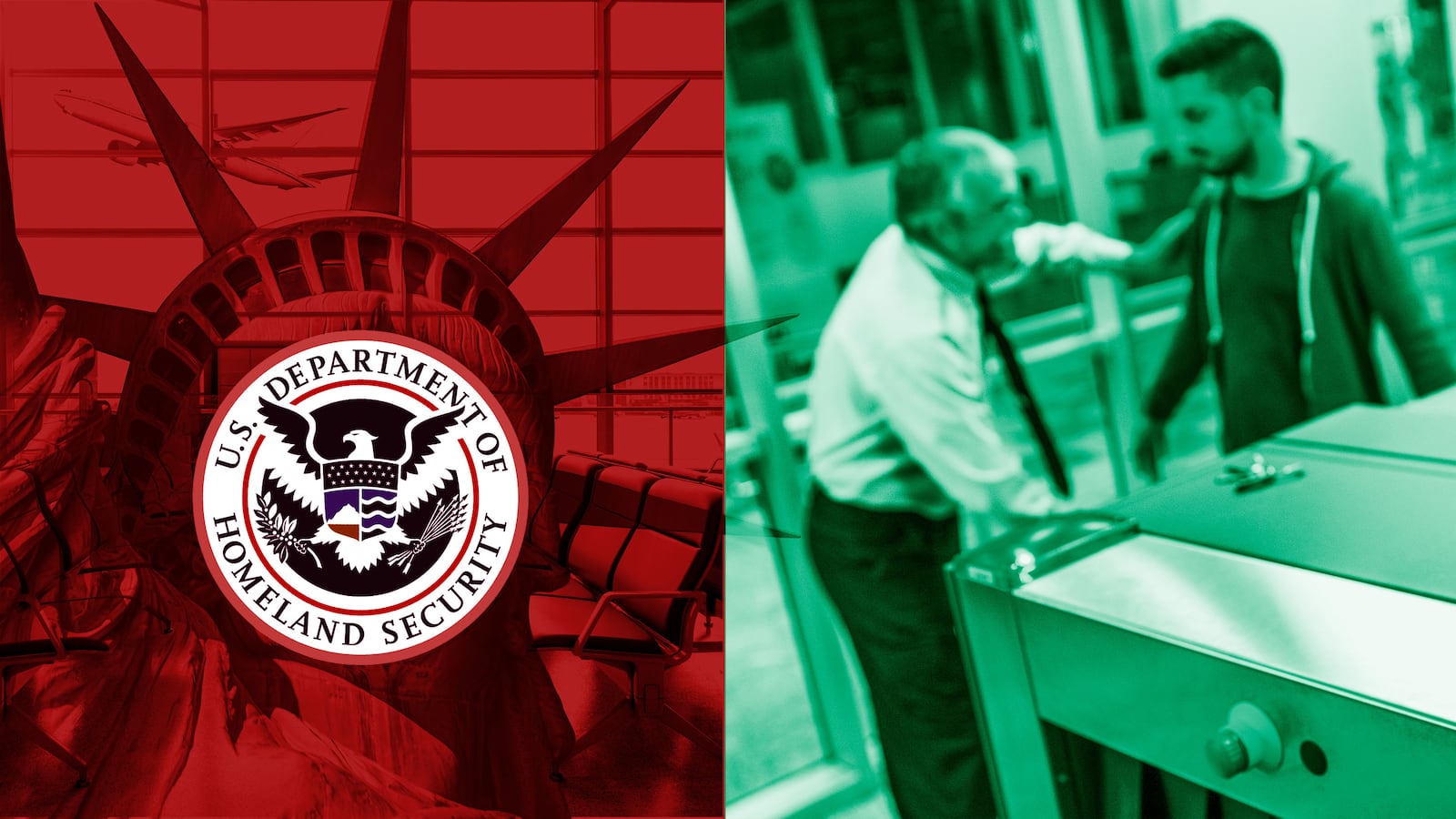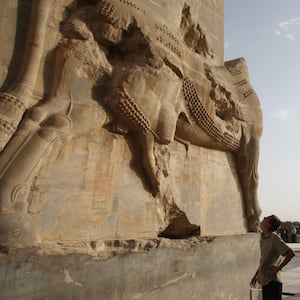Until Sunday morning, University of Pennsylvania academic and historian John Ghazvinian—who left Iran as a baby with his family more than four decades ago and grew up in London and Los Angeles—traveled in and out of the United States with the same freedoms as any other U.S. citizen.
But when he arrived from Cairo at John F. Kennedy International Airport via an Air France connecting flight from Paris—two days after the U.S. military killed one of Iran’s top generals on orders from President Donald Trump—all of that changed.
Ghazvinian, 45, the interim director of Penn’s Middle East Center, was among scores of Americans of Iranian heritage who were subjected over the weekend to heightened government scrutiny—and in some cases extended detention—in the wake of escalating hostilities between the U.S. and Iran, prompted by the drone execution of Quds Force commander and four-star Gen. Qassem Soleimani.
In an email to The Daily Beast, the Customs and Border Protection agency—the law enforcement arm of the Department of Homeland Security that administers the passport control checkpoints at airports and at the borders—denied that Iranian-Americans are being specifically targeted, but that denial has been greeted with skepticism by Ghazvinian and others in the Iranian-American community.
A second Iranian-American who was detained and interrogated by CBP, and asked to be identified only as an executive from the San Francisco Bay Area so as not to create bad publicity for his company, told The Daily Beast that “I have absolutely zero doubt” that his heritage was the decisive factor—mainly because the CBP officer who detained and interrogated him told him so, pointing to the word “Iran” listed as his birthplace on his U.S. passport.
However, “Social media posts that CBP is detaining Iranian-Americans and refusing their entry into the U.S. because of their country of origin are false," said the carefully worded government email attributed to CBP spokesperson Michael Friel. “Reports that DHS/CBP has issued a related directive are also false.”
Another federal government source added: “Based on the current threat environment, CBP is operating with an enhanced posture at its ports of entry to safeguard our national security and protect the American people while simultaneously protecting the civil rights of everyone.”
The Bay Area executive, who holds a government-issued Global Entry card and estimates that he travels internationally for work as many as eight times a year, said he doesn’t believe his civil rights were protected when he, his Korean-born wife, and their two American-born children arrived at the CBP checkpoint in Calgary, Canada, after a week of skiing in Banff.
The 55-year-old executive, who became a naturalized citizen in 1986 and has lived in the United States since he was a 13-year-old boarding school student in 1978—a year before the Iranian Revolution toppled the shah and installed an Islamic Republic—now fears he will be detained and questioned whenever he returns to the United States from a business trip.
“It’s a disappointment to know that I will continue to be treated as a second class citizen because of my place of birth,” he told The Daily Beast in unaccented English, comparing his circumstance to the “stop-and-frisk” police operation that disproportionately targeted African-Americans during Mike Bloomberg's mayoralty in New York City. “How is this different from the color of skin or a religious declaration being used as a form of prejudice? It isn’t,” he added.
“What is the point of a fucking passport and swearing allegiance to country?” the executive angrily demanded, noting that unlike many Iranian-Americans he doesn’t hold dual passports—only a U.S. one—and refuses to revisit the country his family fled as the mullahs were taking over.
On Sunday morning, meanwhile, when the widely traveled historian John Ghazvinian arrived at to the passport checkpoint at JFK, “I was pulled aside. This was the first time that happened to me,” he told The Daily Beast, adding that the passport control officer spent several moments perusing his travel stamps and demanded: “When was the last time you were in Libya?”
“I’ve never been to Libya,” Ghazvinian answered.
After being ordered to wait 10 minutes or so, he was directed to a private room where he suddenly found himself being interrogated by a female immigration officer, who—among a battery of questions—wanted to know what he thought about Soleimani’s death.
“I told her I didn’t really understand how that was relevant,” Ghazvinian recounted, adding that the officer’s tone was “friendly.”
“She said, ‘We just like to know what people think out there.’ And I said, ‘It seems like a political question.’ And she just dropped it and gave me my passport back and that was that.”
Ghazvinian, who had been leading a group of high-school teachers on a two-week trek through Egypt in his role at Penn’s Middle East Center, called his experience “troubling.”
“Even as a U.S. citizen,” Ghazvinian said, “you have to be aware of the fact that some of our cherished rights are sometimes more fragile than we imagine, and we don't know where this might go.”
He acknowledges, however, that he got off easy.
Since Thursday’s lethal attack on Soleimani and other top Iranian military officers on a visit to Iraq, there have been “dozens, but potentially as many as 150 individuals being held for questioning, with each individual being asked to answer questions on: Relatives, occupations, birthdays, the last time they visited Iran and their opinions on current tensions,” the National Iranian-American Council asserted in a statement that raised the possibility that “DHS Customs and Border Protection has issued a new order to detain individuals of Iranian heritage, regardless of their citizenship, and subject them to questioning or interrogation.”
The NIAC statement continued that there were “multiple individuals noting they were held between 11-16 hours; Individuals being held for questioning had American citizenship, Canadian citizenship; or a green card...Some Americans and Canadian citizens and green card holders were also reportedly turned away at the border due to the CBP’s inability to detain and house those detained.”
Many of these incidents occurred, said the statement, when groups of Iranian-Americans were returning to the U.S. by automobile—through the Peace Arch border crossing in Blaine, Washington—from a Persian music concert in Vancouver, Canada.
“At the Blaine POE, wait times increased to an average of two hours on Saturday evening, although some travelers experienced wait times of up to four hours due to increased volume and reduced staff during the holiday season,” the federal government source claimed, adding defensively that “CBP does not discriminate based on religion, race, ethnicity, or sexual orientation.”
The Bay Area executive, who provided The Daily Beast with United Airlines boarding passes and other documents that corroborated his account, said he and his wife and kids drove to Calgary International Airport from Banff on Friday and arrived more than three hours before their 3 p.m. flight to San Francisco.
The U.S. government processes travelers at the CBP checkpoint at the airport, but when the executive scanned his passport in the kiosk, the receipt came back with giant “X” on it.
Instead of the usual fast-track that Global Entry provides, they were directed to a long line that took them half an hour. When he finally presented the family’s passports, the CBP officer cleared his wife and kids but ordered him to step to the side. The officer told the executive’s wife that she and her children were cleared to go to the gate, but that he’d have to stay for a bit. They chose to stay with him, the executive said.
“I was shocked,” he recalled, while his children, a 12-year-old son and 15-year-old daughter, were simply “puzzled.”
They were led into a waiting room flanked by interrogation rooms, and in due course a CBP officer appeared and beckoned the executive into one of the interrogation rooms.
The officer questioned him closely about his Iranian origins, asked him if he had ever served in the Iranian military—“I left when I was 13!” the executive protested—and pressed on with a series of questions that the executive attempted to cut short by mentioning his Global Entry status and the fact that he’d once worked for the U.S. Treasury Department.
“I’m sorry, I have to go through these questions,” the CBP officer allegedly said.
“He felt bad about it,” the executive recounted. “He realized that this was not normal. I could tell by his tone.”
Finally, the CBP officer told him he was free to go, and the executive said he had to explain the incident to his anxious children—confiscating their cell phones as they sat down in an airport restaurant before their flight.
“I told them I didn’t want the cell phones there because the government had the ability to eavesdrop,” the executive recalled.
Yet he said he still becomes emotional when he thinks of the day in 1986 when he became an American citizen.
“I remember the day, in one of the largest halls in Los Angeles,” the executive said, recalling that he stood and took the citizenship oath with around 7,000 other new Americans.
“It still brings tears to my eyes. I remember all the flags in this hall, and the echo. It’s one of those things you never forget. And I’m proud of it. My kids speak only one language, English, to the detriment of my own culture. I want them to blend in. Because I know what it’s like when you don’t blend in.”







